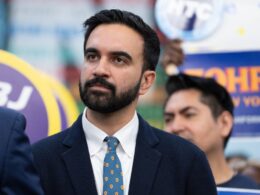One of the nation’s largest self-directed home care programs has undergone an exciting transformation that’s already benefiting New Yorkers.
The state’s Consumer Directed Personal Assistance Program (CDPAP) has long been a lifeline for hundreds of thousands of New Yorkers, empowering seniors and people with disabilities to hire caregivers they trust.
But the program’s rapid growth and fragmented infrastructure made it easy to exploit and hard to manage. CDPAP wasn’t operating as intended: more than 600 companies that served as financial middlemen each used different rules, systems, and oversight.
No other state has close to 600 fiscal intermediaries — most moved to one or two years ago. As a result, CDPAP ballooned into a costly, patchworked system that lacked consistency and accountability, costing taxpayers $9 billion a year.
I’ve spent my career in public health, and I believe that accountability, efficiency, and compassion go hand-in-hand. When public dollars are misused, taxpayers and the people who rely on programs suffer. Under the previous system, fiscal intermediaries were paid up to $1,050 per member per month in administrative fees — more than 14 times the national average of $75.
That’s why New York moved to a single fiscal intermediary for CDPAP — to strengthen and sustain the program and bolster rule compliance. Public Partnerships LLC (PPL) was selected among multiple bidders and reduced administrative fees by 93% to $68.50 per member per month — saving taxpayers hundreds of millions annually while significantly enhancing the level of care and support for consumers — simplifying systems, reducing administrative burden, and making care more accessible and reliable.
Equally important, we’ve remained steadfast in ensuring that this efficiency never comes at the expense of compassion. Every reform is guided by one principle — improving seamless access to quality care for the people who depend on it most. That principle is deeply embedded in the culture of PPL and shared by all 2,000-plus of our employees.
And we’re going several steps further.
Previously, it was nearly impossible to detect fraudulent or unsafe behavior occurring in CDPAP because the program lacked centralized oversight. PPL’s systems have changed that.
In just a few months, we’ve identified patterns of poor practices that contributed to the program growing 1,200% over the last 10 years. We’ve found examples of personal assistants (PAs) billing for consumers who were deceased or hospitalized, or billing for hours when they were not present with the consumer. These findings mark the beginning of a new era of accountability — one where data and oversight drive meaningful improvements in care quality and program integrity.
We’re also generating savings through targeted program improvements that protect participants and the public. For example, our analytics identified more than 1,000 PAs logging more than 20 hours of work per day for three or more consecutive days, including some for 10 days or more.
Excluding consumers approved for 24-hour care, this group of cases alone adds up to millions in annualized expenditures. At worst, this is an example of inaccurate reporting, but regardless, these extreme hours jeopardize care and are a serious risk to the health and safety of both caregivers and consumers.
We are also consistently enforcing the foundation of self-directed care: consumer oversight. Consumers must now review and approve the hours their caregivers submit. This practice — which is not a new requirement but was inconsistently enforced previously — allows consumers to deny inaccurate or overlapping timesheets, preventing duplicate payments that waste taxpayer dollars.
Today, approximately 210,000 consumers and 242,000 personal assistants are active in New York’s CDPAP under PPL. Now, every dollar and every hour of care provided is subject to a more thoughtful and thorough review.
With tools and technology such as unique PA identifiers, electronic visit verification, and an easy-to-use timekeeping app, we can detect non-compliant practices that previously went unnoticed. These improvements will generate hundreds of millions of dollars in overall savings and speak to a larger truth: meaningful oversight makes the system better and more sustainable in the long run, safeguarding the program for those who need it most.
PPL is committed to our mission of protecting New York’s Medicaid budget and serving its citizens with integrity. We never lose sight of the people behind the numbers — the families, PAs, and consumers who rely on us to make care more accessible, reliable, and humane. That’s what our work is all about, and that’s why we intend to ensure every dollar is spent with the integrity needed to sustain this critical program.
Kapoor is CEO of Public Partnerships LLC (PPL).








